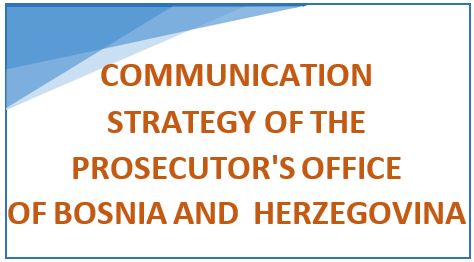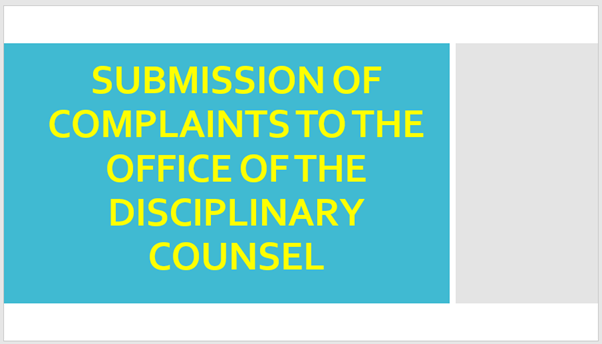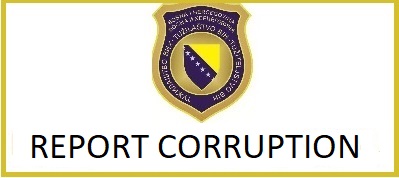Public Relations
Frequently asked questions
When should a criminal report be filed?
Every citizen has the right and duty to report on perpetration of a criminal offence if he/she is aware of it. In some cases failure to report criminal offences may also be a criminal offence.
Who should a criminal report be filed to?
The report shall be filed to the Prosecutor in writing or verbally. If the report is made verbally a person submitting it shall be warned about the consequences of false reporting. A record shall be made about a verbally made report and if the report is given by the phone an official note shall be made. If the report is filed to the Court, an authorised official or some other Court or Prosecutor in Bosnia and Herzegovina, they will take the report and send it to the Prosecutor’s Office of BiH if it is about a criminal offence under its jurisdiction.
What are the next steps taken about the criminal report?
If the Prosecutor has assessed that there are grounds for suspicion that a criminal offence was committed an order for conducting an investigation shall be made with the following content: data on perpetrator if known, descriptions of the act pointing out the legal elements which make it a crime, legal name of the criminal offence, circumstances that confirm the grounds for suspicion for conducting an investigation and existing evidence. The Prosecutor shall list in the order which circumstances need to be investigated and which investigative measures need to be undertaken.
The Prosecutor shall not order the investigation if it is evident from the report and supporting documents that a reported act is not a criminal offence, if there are no grounds to suspect that the reported person committed the criminal offence, if the statute of limitations is applicable or if the criminal offence is a subject to amnesty or pardon or if any other circumstances exist that preclude criminal prosecution.
If the Prosecutor has assessed that there are grounds for suspicion that a criminal offence was committed an order for conducting an investigation shall be made with the following content: data on perpetrator if known, descriptions of the act pointing out the legal elements which make it a crime, legal name of the criminal offence, circumstances that confirm the grounds for suspicion for conducting an investigation and existing evidence. The Prosecutor shall list in the order which circumstances need to be investigated and which investigative measures need to be undertaken.The Prosecutor shall not order the investigation if it is evident from the report and supporting documents that a reported act is not a criminal offence, if there are no grounds to suspect that the reported person committed the criminal offence, if the statute of limitations is applicable or if the criminal offence is a subject to amnesty or pardon or if any other circumstances exist that preclude criminal prosecution.
Shall I be informed if the investigation is not going to be conducted?
The Prosecutor shall inform the injured party and the person who reported the offence within three (3) days of the fact that the investigation shall not be conducted, as well as the reasons for not doing so. The injured party and the person who reported the offence have a right to file a complaint with the Prosecutor’s Office within eight (8) days.
Who is a "suspect"?
The term “suspect” refers to a person with respect to whom there are grounds for suspicion that the person may have committed a criminal offence and against whom the indictment has not been confirmed.
Who is "the accused"?
The term "accused" is used for a person against whom one or more counts in an indictment have been confirmed.
Who is "the convicted"?
The term "convicted person" refers to a person pronounced criminally responsible for a particular criminal offence in a final verdict.
What are my rights if I am unjustifiably convicted of a criminal offence or deprived of liberty without cause?
A person who has been unjustifiably convicted of a criminal offence or deprived of freedom without cause shall have the right to non-material rehabilitation, compensation for damages from the budget, as well as other rights stipulated by the law.A suspect shall have a defence attorney at the first questioning if he is mute or deaf or if he is suspected of a criminal offence for which a penalty of long-term imprisonment may be pronounced.
A suspect or accused must have a defence attorney immediately after he has been assigned to pre-trial custody, throughout the pre-trial custody.
After an indictment has been brought for a criminal offence for which a prison sentence of ten (10) years or more may be pronounced, the accused must have a defence attorney at the time of the delivery of the indictment.
If the suspect, or the accused in the case of a mandatory defence, does not retain a defence attorney himself, or if the persons legally entitled to it do not retain a defence attorney, the preliminary proceeding judge, preliminary hearing judge, the judge or the Presiding judge shall appoint him a defence attorney in the proceedings. In this case, the suspect or the accused shall have the right to a defence attorney until the verdict becomes final and, if a long-term imprisonment is pronounced for proceedings under legal remedies.A suspect shall have a defence attorney at the first questioning if he is mute or deaf or if he is suspected of a criminal offence for which a penalty of long-term imprisonment may be pronounced.A suspect or accused must have a defence attorney immediately after he has been assigned to pre-trial custody, throughout the pre-trial custody.After an indictment has been brought for a criminal offence for which a prison sentence of ten (10) years or more may be pronounced, the accused must have a defence attorney at the time of the delivery of the indictment.If the suspect, or the accused in the case of a mandatory defence, does not retain a defence attorney himself, or if the persons legally entitled to it do not retain a defence attorney, the preliminary proceeding judge, preliminary hearing judge, the judge or the Presiding judge shall appoint him a defence attorney in the proceedings. In this case, the suspect or the accused shall have the right to a defence attorney until the verdict becomes final and, if a long-term imprisonment is pronounced for proceedings under legal remedies.
When is an ex officio defence attorney appointed to the suspect or the accused?
If the Court finds it necessary for the sake of justice, due to the complexity of the case or the mental condition of the suspect or the accused, it shall appoint an attorney for his defence.
In the case of appointing a defence attorney, the suspect or the accused shall be asked to select a defence attorney from the presented list himself. If the suspect or the accused does not select a defence attorney from the presented list himself, the defence attorney shall be appointed by the Court.
If the Court finds it necessary for the sake of justice, due to the complexity of the case or the mental condition of the suspect or the accused, it shall appoint an attorney for his defence.In the case of appointing a defence attorney, the suspect or the accused shall be asked to select a defence attorney from the presented list himself. If the suspect or the accused does not select a defence attorney from the presented list himself, the defence attorney shall be appointed by the Court.
As I am an indigent person can I have an ex officio defence attorney?
When conditions are not met for the mandatory defence, and the proceedings are conducted for an offence for which a prison sentence of three (3) years may be pronounced or more or when the interests of justice so require, regardless of the prescribed punishment, a defence attorney shall be assigned to the accused at his request if, due to an adverse financial situation, he is not able to pay the expenses of the defence.
When can a request for appointment of an ex officio defence attorney be filed by an indigent person?
The request for appointment of a defence attorney may be filed at any time during the criminal proceedings. The preliminary proceeding judge, preliminary hearing judge, the judge or the Presiding judge shall appoint the defence attorney after the suspect or the accused was given an opportunity to select a defence attorney from the presented list.
Is there a death sentence?
No, there is no death sentence in Bosnia and Herzegovina and the highest sentence is a long-term imprisonment.
What is the course of the criminal proceedings?
The criminal proceedings are conducted as shown in the diagram.
 The Prosecutor's Office of Bosnia and Herzegovina
The Prosecutor's Office of Bosnia and Herzegovina








